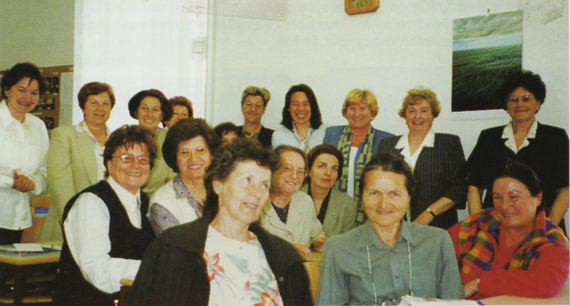Učimo se nemško
Oh Weh, oh Weh...
Oh weh, oh weh, wer soll mir bei der Arbeit im Garten helfen? Mein Mann? Nein. Er braucht selbst Hilfe von mir. Er hat auch keine Lust zu arbeiten und geht lieber spazieren.
Die Kinder auch nicht. Sie haben den ganzen Tag Dienst.
Oh weh, wer hilft mir, die Wohnung aufzuräumen? Die Nachbarin? Sie räumt sogar ihre nicht auf. Und ich habe arge Schmerzen im Bein. Ich habe viele Probleme bei der Bewegung.
Oh weh, wer hilft mir mit der Hausaufgabe? Niemand! Das muss ich auch allein machen.
Marija Vilar
In meinem Garten
Vorige Woche ordnete ich in meinem Garten die Beete und pflanzte schöne Blumen. Bernard, mein junger Nachbar, kam mir helfen. Er brachte seine kleine Schaufel mit und schaufelte etwas Erde. Bernard hatte den fünften Geburtstag am Sonntag vorher gefeiert und hatte sich über meine Geschenke gefreut. Bernard und ich arbeiteten einige Zeit fleißig zusammen und unterhielten uns. Er sang mir auch ein schönes Lied vor. Dann sagte er: "Wenn ich groß bin, werde ich nicht arbeiten. Ich werde nur befehlen."
Ich fragte ihn: "Wem wirst du befehlen?" Bernard dachte eine Weile nach und dann antwortete er: "Ich werde dir, Tante Marika, befehlen."
Marika Sešek
Groll und Rache sei vergessen
Groll und Rache sei vergessen,
unserm Todfeind sei verziehn,
keine Träne soll ihn pressen,
keine Reue nage ihn.
(Friedrich Schiller - An die Freude)
Solche Position fehlt uns allen. Den Feinden zu verzeihen, ist nötig nicht nur zwischen individuellen Menschen, sondern auch zwischen verschiedenen Völkern. Rache ist der schlechteste Teil des menschlichen Charakters. Es ist schwer, alles zu vergessen, alles zu verzeihen. Wir alle haben viele Ausreden für unseren Groll, das betrifft sowohl die Einzelnen als auch die breitere Gesellschaft und die Staaten. So geht es weiter ohne Ende immer tiefer. Alle meinen, dass ein Einzelner nichts dafür tun kann. Eben das ist der größte Fehler. Es ist immer möglich, etwas zu tun. Man muss jedoch bei sich selbst beginnen. Groll und Feindseligkeit schaden zuerst uns selbst. Sie schaden unserem guten Schlaf, unserer Schönheit, unserer Zufriedenheit und unserer Gesundheit.
Es ist nicht nötig, alles zu vergessen, aber es ist nötig, alles zu verzeihen so schnell wie möglich für das Gute in einem selbst.
Ana Gramc
Mein bester Freund
 Er war mein bester Freund. Mit ihm machte ich meine ersten Schritte. Er passte immer auf mich auf. Er war mit mir sehr zärtlich. Wenn ich mich anstieß, war er sofort bei mir. Er stillte das Blut und wischte mir die Tränen ab. Ich durfte ihm alles sagen. Er verstand mich immer. Mit mir war er sehr geduldig. Ich durfte ihm alles antun und manchmal war ich nicht besonders lieb mit ihm. Er war nie beleidigt, er verstand meine Ungezogenheit. Wir spielten sehr viel zusammen. Im Winter rodelte ich sehr gern. Er ging immer mit mir, aber er wollte nicht mit der Rodel fahren. Das konnte ich nicht verstehen. Ich fuhr mit der Rodel und er lief daneben her.
Er war mein bester Freund. Mit ihm machte ich meine ersten Schritte. Er passte immer auf mich auf. Er war mit mir sehr zärtlich. Wenn ich mich anstieß, war er sofort bei mir. Er stillte das Blut und wischte mir die Tränen ab. Ich durfte ihm alles sagen. Er verstand mich immer. Mit mir war er sehr geduldig. Ich durfte ihm alles antun und manchmal war ich nicht besonders lieb mit ihm. Er war nie beleidigt, er verstand meine Ungezogenheit. Wir spielten sehr viel zusammen. Im Winter rodelte ich sehr gern. Er ging immer mit mir, aber er wollte nicht mit der Rodel fahren. Das konnte ich nicht verstehen. Ich fuhr mit der Rodel und er lief daneben her.
Einmal machten wir einen langen Spaziergang durch den Wald. Ich war ziemlich müde und ging mit ihm in sein Haus. Ich weiß nicht, wann ich einschlief. Plötzlich hörte ich meine Schwester: "Mutti, Mutti! Metka ist da in Tokis Haus. Er lässt mich nicht in die Nähe."
"Was? Ist das möglich? Metka ist in der Hundehütte. Toki, geh weg!" Mein guter Freund Toki ließ auch meine Mutter nicht in die Nähe. Er passte auf mich auf.
"Gott sei Dank! Metka ist da. Ihr braucht das Kind nicht mehr zu suchen", rief meine Mutter. Ich kroch aus der Hundehütte und kletterte zu meiner Mutti und Toki kam auch. Wir beide hatten unsere Mutti sehr gern. Bei ihr war es immer sehr warm und das wussten wir beide gut.
Metka Zupanek
|
Die Augen lügen nie Die Augen lügen nie, Die Augen lügen nie. Blicke mir in die Augen! Janka Jerman |
Oči nikoli ne lažejo Oči nikoli ne lažejo. Oči nikoli ne lažejo. Poglej v moje oči! |

